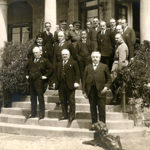Published April 3, 2008
Templeton Enterprise Awards Symposium
Introductory remarks to the book awards panel
Templeton Enterprise Awards Symposium
Ethics and Public Policy Center — ISI
Washington, DC, 3 April 2008
Our book and article award panelists will span 2,300 years today and range from Aristotle to Augustine, Aquinas, Hume, Adam Smith, Kant, Tocqueville and Hannah Arendt to Michael Novak. I am an economist, not a philosopher. But there have been three basic theories of economics, expressing three corresponding world views, and I think it may help to spend a few minutes recalling their similarities and differences before beginning our discussion.
What is economics about?
Jesus once made the empirical observation that since the days of Noah and Lot, people have been doing, and until the end of the world presumably will be doing,,four kinds of things. He gave these examples: “planting and building,” “buying and selling,” “marrying and being given in marriage,” and “eating and drinking” (Luke 17:26-8). In other words, we humans produce, exchange, give, and use our human and nonhuman goods.
A Brief, Remedial History of Economics.
Scholastic economics (1250-1776) began when Thomas Aquinas integrated these four elements (production, exchange distribution and consumption), all drawn from Aristotle and Augustine, in an outline integrated at the individual, domestic and political levels. This scholastic outline was taught by Catholics and Protestants (after the Reformation) for more than five centuries. Classical economics (1776-1871) began when Adam Smith cut these four elements to two, trying to explain “division of labor” by production and exchange alone, eliminating distribution and consumption. Today’s “neoclassical” economics (1871-c.2000) began when three economists[1] independently reinvented Augustine’s theory of utility, reintegrating consumption with production and exchange, but not distribution. I think “neoscholastic” economics will revolutionize the field again by restoring the missing element of distribution.
The three worldviews.
When Paul preached in the marketplace of Athens, he prefaced the Gospel with a Biblically orthodox adaptation of Greco-Roman natural law. The evangelist Luke tells us that “some Epicurean and Stoic philosophers argued with him” (Acts 17:18). The same dispute continues among (neo)scholastic, classical and neoclassical economists. In (neo)scholastic natural law, economics is a theory of rational providence, describing how we choose both persons as “ends” (expressed by our personal and collective gifts) and the scarce means used (consumed) by or for those persons, which we make real through production and exchange. By dropping both distribution and consumption, Smith expressed the Stoic pantheism that viewed the universe “to be itself a Divinity, an Animal”[2] with God as its immanent soul, while sentimental humans choose neither ends nor means rationally. By restoring consumption but not distribution, neoclassical economics expresses the Epicurean materialism that claims humans somehow evolved as clever animals, adept at calculating means but not ends, since “reason is, and ought only to be, the slave of the passions.”[3] I have found these philosophical differences helpful in interpreting the differences in economic theory used by economists, and suspect they will also prove useful for our discussion.
— John D. Mueller is a Fellow and directs the Economics and Ethics Program at the Ethics and Public Policy Center.
Endnotes:
1 W.S. Jevons in England, Carl Menger in Austria, and Leon Walras in Switzerland.
2 Adam Smith [1795], “Essays on Philosophical Subjects,” in The Early Writings of Adam Smith, ed. J. Ralph Lindgren, Augustus M. Kelley, New York, 1967.
3 David Hume, A Treatise of Human Nature, II, III, iii, http://www.gutenberg.org/dirs/etext03/trthn10.txt.












